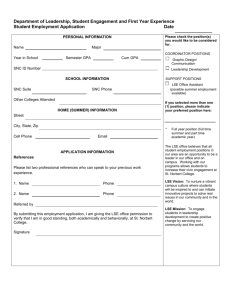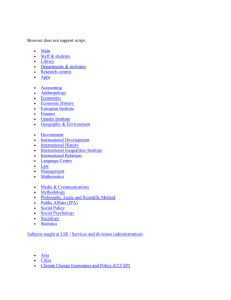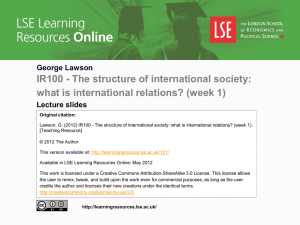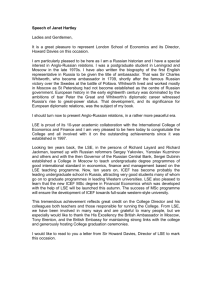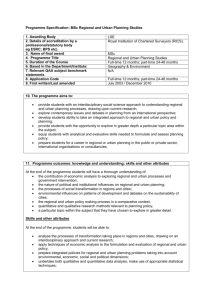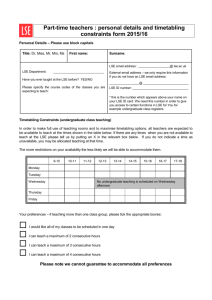LONDON SCHOOL OF ECONOMICS AND POLITICAL SCIENCE
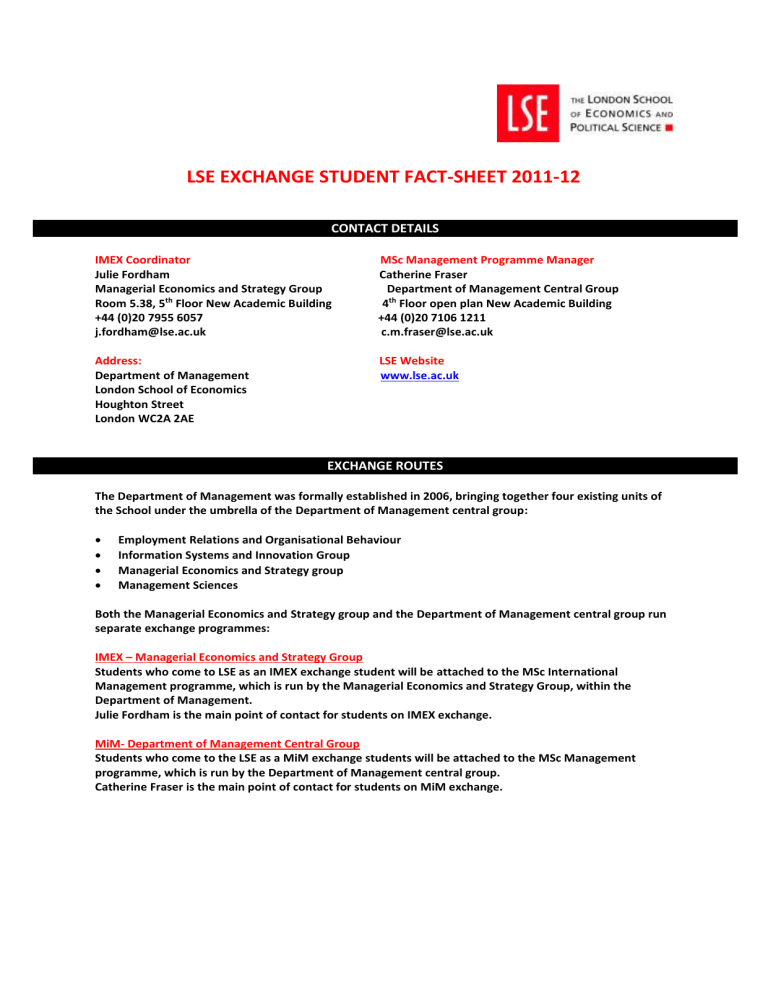
LSE EXCHANGE STUDENT FACT-SHEET 2011-12
CONTACT DETAILS
IMEX Coordinator MSc Management Programme Manager
Julie Fordham Catherine Fraser
Managerial Economics and Strategy Group Department of Management Central Group
Room 5.38, 5 th Floor New Academic Building 4 th Floor open plan New Academic Building
+44 (0)20 7955 6057 +44 (0)20 7106 1211 j.fordham@lse.ac.uk c.m.fraser@lse.ac.uk
Address: LSE Website
Department of Management www.lse.ac.uk
London School of Economics
Houghton Street
London WC2A 2AE
EXCHANGE ROUTES
The Department of Management was formally established in 2006, bringing together four existing units of the School under the umbrella of the Department of Management central group:
Employment Relations and Organisational Behaviour
Information Systems and Innovation Group
Managerial Economics and Strategy group
Management Sciences
Both the Managerial Economics and Strategy group and the Department of Management central group run separate exchange programmes:
IMEX – Managerial Economics and Strategy Group
Students who come to LSE as an IMEX exchange student will be attached to the MSc International
Management programme, which is run by the Managerial Economics and Strategy Group, within the
Department of Management.
Julie Fordham is the main point of contact for students on IMEX exchange.
MiM- Department of Management Central Group
Students who come to the LSE as a MiM exchange students will be attached to the MSc Management programme, which is run by the Department of Management central group.
Catherine Fraser is the main point of contact for students on MiM exchange.
TERM DATES AND REGISTRATION
Fall Term
Thursday 4 th October - Friday 14 th December 2012.
Spring Term
Monday 14 th January - Friday 22 nd March 2013
Registration
All students must complete and return the following documents:
LSE registration form
Passport-sized photograph (Jpeg), which will be used for the LSE student ID card.
The ID card will be ready for when students arrive and will be activated by their first use of the LSE IT facilities. The card gives access to IT, the Library and all other LSE services
Fall Term registration deadline: End of June 2012
Spring Term registration deadline: Mid November 2013
COURSES
Language of instruction: English
Course registration takes place during the first two weeks of term. Students are advised to audit as many courses as they are interested in during the first two weeks and then select the three or four they wish to be assessed upon by the end of week two.
The full list of graduate taught courses can be found at: http://www.lse.ac.uk/resources/calendar/courseGuides/graduate.htm
Courses taught over one term only are denoted by ‘Half Unit’ next to the course number. Look under
‘teaching’ to find out which term the course is taught in. MT = Michaelmas Term which is the Fall Term, LT
= Lent Term which is the spring term. Further details on the courses available and how to register will be sent to students prior to their arrival.
PLEASE NOTE THE FOLLOWING POINTS:
Teaching at the LSE tends to be very theoretical and a sound background in economics and maths is advantageous. Exchange students should be aware that LSE is NOT a business school and we DO NOT offer traditional practical business/management courses.
Some courses, especially finance, are limited to a particular cohort of LSE students so any student who is particularly keen on doing finance at LSE should check on the availability of courses before committing themselves to an exchange term.
Work load
All students take a minimum of three, maximum of four 0.5 unit courses.
Normally students will have a series of lectures, with the entire class, and also smaller seminar groups
(maximum of 15 students) for more in-depth discussion and analysis.
Contact time with class lecturers and teachers is low at LSE in comparison to what you may be used to.
However, you will be expected to do a lot of reading and research around the class material in order to achieve good results in the assessment.
Grading
The LSE grade on the basis of Distinction, Merit, Pass and Fail.
Distinction = over 70% A
Merit = 60 - 69% B
Pass = 50 - 59% C
Fail = Below 50%
Assessment
The LSE exam period is in the summer term regardless of when a course has taken place. Therefore you need to be assessed by a different means to regular LSE students as you will have returned to your home school (and probably graduated!) by the time the LSE exams take place. Most exchange students are assessed on the basis of one or two assignments per course and their attendance and participation in class sessions (seminars). Grading will be based on the A – E scale common in Europe, whereby C is the minimum pass level.
Sample list of electives available:
Fall Term
AC471 Accounting in the global economy
AC491 Financial accounting, reporting and control
DV423 Global political economy and development I
GI409 Globalisation and Gender
GY407.1 Globalization, Regional Development and Policy
ID410 Management of Human Resources: Strategies and Policy
ID430 Organisational Behaviour
IS472 Information systems Management
MG426 Organisations in the economy and society
MN404 Incentives and Governance in Organisations
MN413 International Marketing Management: A Strategic Approach
MN415 The Analysis of Strategy A
MN425 Business in the Global Environment
MN429 The World Trading System
MN432 Personnel Economics
OR434 Principles of Decision Sciences
Spring Term
AC444 Valuation and Security Analysis
AC490 Management Accounting, Decisions and Control
GY407.2 Globalization, Regional Development and Policy
ID420 Leadership in Organisations: Theory and Practice
ID423 The Dark Side of the Organisation
ID433 Negotiation Analysis
IS484 Aspects of Managing Information Risk and Security in Business
IS485 Aspects of the Management and Economics of E-Business
MG418 Open Innovation
MG421 The Future of the Multinational Firm
MG422 Thinking Strategically
MG435 International Business and Governance
MG482 Innovation and Technology Management
MG436 Firms, Markets and Crises
MG437 Business Model Innovation at the Base of the Pyramid
MN430 Strategy for the Information Economy
OR436 Operations Management
VISA
Once you have completed and returned your registration forms, the LSE student services centre will contact you and provide any documents or information you may require from us.
Non-EU citizens may or may not need a Tier 4 Student Visa, depending on their nationality and their length of stay. Many of you may be eligible to apply for a student visitor visa.
Please read the information on the LSE International Student Immigration Service webpage carefully: http://www2.lse.ac.uk/intranet/students/studentServicesCentre/ISIS/Home.aspx
You can also get information and advice from:
UK Council for International Student Affairs (UKCISA) http://www.ukvisas.gov.uk/en/doineedvisa/
ACCOMMODATION
The LSE does not offer housing to incoming exchange students as there are only a limited number of rooms available and priority is given to students who are studying at the LSE for the whole academic year.
However, when we send out our student information pack we send comprehensive information to assist students in finding accommodation through the private sector.
Useful links: http://www2.lse.ac.uk/lifeAtLSE/accommodation/privateHousing/findingPrivateHousing/find.aspx
http://housing.london.ac.uk/cms/area-guide.html
http://www.netletlse.co.uk
http://www.ukcisa.org.uk/
We can only offer limited support as it is the students’ responsibility to find their own accommodation.
FACILITIES
Library http://www.lse.ac.uk/library/
IT Services http://www.lse.ac.uk/itservices/facilities/public_computer_areas.htm
LSE Medical Centre http://www.lse.ac.uk/collections/medicalCentre/
The Students’ Union: http://www.lsesu.com/
Sports Facilities: http://www.lsesu.com/pages/Services/Gym/
Events http://www.lse.ac.uk/collections/LSEPublicLecturesAndEvents/
LSE students union http://www.lsesu.com/
Student services centre http://www2.lse.ac.uk/intranet/students/home.aspx
Disability and well-being office: http://www2.lse.ac.uk/lifeAtLSE/studentSupportAndServices/disabledStudents.aspx
Chaplaincy: http://www.lse.ac.uk/collections/chaplaincy/
Advice and student counselling service http://www.lse.ac.uk/collections/studentCounsellingService/
CAREERS SERVICE
Exchange students have access to all the services offered by the LSE Careers Service during the term that they are here.
This includes careers information on the website, the online vacancy board, one-to-one careers advice, CV feedback, careers seminars and practice interviews.
You can access these services once you have formally registered at the LSE (usually in late September for
Fall students or early January for Spring students).
Students are encouraged to take advantage of the range of events organised by the Careers Service, including career fairs, workshops, company presentations and skills sessions and to apply for internships which are promoted by the School.
Most internships are posted on our online vacancy board which you can access via My Careers Service.
LSE Careers Service
Floor 3, Tower 3
London, WC2A 2AZ
Tel: +44 (0)20 7955 7135; Fax: +44 (0)20 7955 6846
Opening hours:
Mondays to Thursdays: 10am - 5pm; Fridays: 11am - 5pm
General queries: careers@lse.ac.uk
.
LANGUAGE CENTRE
There are currently no language courses offered for exchange students. It is not possible to take a course at the LSE language centre as all courses last the full academic year and you would be required to pay fees for the entire year. Students will however have access to the language centre facilities: http://www2.lse.ac.uk/language/Home.aspx
LONDON
The following websites provide useful information on life in London, including travel and events!
Travel http://www.tfl.gov.uk/
Things to do in London http://www.visitlondon.com/ http://www.timeout.com/london/
Life at LSE http://www2.lse.ac.uk/lifeAtLSE/lifeHome.aspx
INSURANCE
Health Insurance: http://www.lse.ac.uk/collections/medicalCentre
Exchange participants must arrive with their own health insurance that covers all international incidents.
More information about health insurance can be found here: http://www2.lse.ac.uk/intranet/students/studentServicesCentre/newArrivals/healthIssues.aspx
General Insurance http://www.lse.ac.uk/collections/studentServicesCentre/Finance/insurance.htm
LIVING EXPENSES
Living in London can be expensive and it is important that you do not underestimate the costs involved.
The following links give more detailed information about the cost of studying in the UK. http://www.studentcalculator.org.uk/international/ http://www.ukstudentlife.com/Ideas/Articles/Cost.htm
http://www.monetos.co.uk/service/student-life/
The LSE's very general estimate of minimum living costs for the 2011/12 academic session is £1000 per month. However, this can only be a very general estimate as how much you spend is up to you. London can be as expensive as your individual tastes dictate.
Housing: Depending on the area, costs can range from £120 per week (for a room in a shared house further out of London) to £200 (for a room which is more central). A small apartment near to the centre of London can be found for around £300 per week. Transport links in London are excellent so we recommend students consider looking at areas not right in the centre. The University of London website has information on various areas around London and the transport zone they are in. http://housing.london.ac.uk/cms
Transport: Costs for the underground and buses vary from one zone to another; with zone one being the most central. A monthly travel pass in zone 2 would be approximately £99 per month and in zone 3 about
£116 per month. Once fully registered at LSE students may apply for a student travel card which will reduce fares by around 30%.
Books and course materials: Can be kept to a minimum as we have excellent library facilities at the LSE.
However, if students prefer to buy books these can be anything from £15 - £30 per course or even higher.
Some courses have a ‘course pack’ which is a collection of reading materials needed for the course, these cost around £25.
Food and Entertainment: It is extremely difficult to be specific about living costs as London is a very tempting place to spend a lot of money on eating out and entertainment. It is possible to live reasonably cheaply if you shop wisely by using local markets for fresh foods and supermarkets for basics. Local ‘corner shops’ are much more expensive on the whole .
